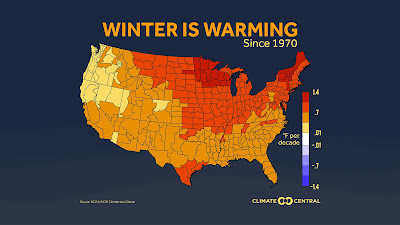and cool, the amount of pollution we humans have pumped into the atmosphere have created a greenhouse effect, warmed oceans, triggered weather extremes (colder, shorter winters, longer, hotter summers and the like); stronger storms (hurricanes/typhoons, tornadoes, flooding rainmakers) and research has shown there are also drastic Seasonal Changes around the world. Here's the latest study:
(Image: https://medialibrary.climatecentral.org/resources/warming-winter-2017)
Climate Change Has Affected Seasons Worldwide
In January, even before the coronavirus pandemic put the world askew, Jan Tore Jensen noticed some disturbing changes to the rhythms of life in his home city of Oslo, Norway. “The botanical garden in Oslo was opening up. Flowers were blooming, and something was kind of off,” recalls Jensen, head of Norwegian outdoor-gear company Bergans.
The normally wintry city was free of snow until the last day of January, and for the first time ever, Oslo ― along with fellow Scandinavian cities Stockholm, Copenhagen and Helsinki ― witnessed temperatures above freezing every day of the month, the warmest European January on record.
While the past year has brought dramatic manifestations of a warming planet — Cyclone Amphan killed more than 100 people in India and Bangladesh and Hurricane Laura caused widespread damage to the Caribbean and the U.S. — such catastrophes have a specific geography and time span.
Those who live in the American West couldn’t easily escape the climate implications of this fall’s massive wildfires, but for people elsewhere in the country, this unprecedented disaster was often painted as just a California problem. People often fail to understand climate change because it can feel either too doom-ridden or too distant from their personal lives, research has found.
Climate change is wreaking havoc on both seasonal patterns and the cultures and histories that are connected to them.




No comments:
Post a Comment